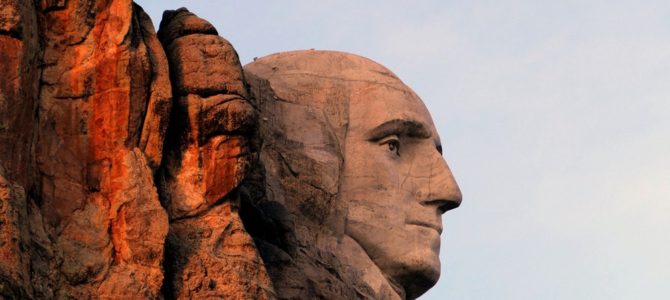
It’s no secret Americans are divided. Liberals pit themselves against conservatives, often bitterly. There are even factions amongst those camps. Leftists, led by the likes of Rep. Alexandria Ocasio-Cortez, are seeking to dominate the more moderate elements of the Democratic Party. The fusion of libertarians and conservatives, absent the unifying threat of communism and the Cold War, is fraying.
In such a fractious environment, perhaps we should turn to our first president, who warned us of the dangers of political parties and in whom a public spirit reigned “almost before there was any public to be spirited about.” What would he have to say about the libertarian-conservative debate?
Following the Revolutionary War, America was economically weak. So George Washington took measures to ensure financial growth. He championed the Potomac River project to established a network of roads and tributaries that connected separate parts of the country. This would allow citizens to travel and trade with one another, improving the lives of everyday Americans and securing the promise of prosperity to millions yet unborn. This was an end worthy of the attention of America’s father.
Washington also saw prosperity as a means. It can satisfy material needs while creating the conditions for a nation and a people to act justly. Mothers would not be forced to steal for themselves and their children to survive. A wealthy country need not renege on debts to its allies. Prosperity makes that possible.
Yet beyond such advantages, Washington saw prosperity as necessary for the accomplishment of his greatest task: the establishment of an American national character.
The Potomac River project was essential because it would “bring the States on the Atlantic in close connexion with those forming to the westward, by a short and easy transportation.” Without this, Washington could “easily conceive” that Americans would have “different views, separate interests and other connexions.”
At a time many people thought of themselves as citizens of a particular state, rather than a nation, free trade and travel would promote cultural education and unity. It would bring Americans together for those simple and everyday exchanges that combat prejudice and encourage reciprocal goodwill.
Furthermore, Washington was not only establishing commerce but a marketplace of ideas. If individuals could travel for trade, they could also gather to deliberate. Citizens across states lines could converse and come to a consensus. This would ensure that all Americans, regardless of locality, were dedicated to a shared set of principles.
Washington did not promote prosperity so that atomistic individuals could each pursue their own desires. He did it for the sake of unity, so citizens would be willing to “make those concessions which are requisite to the general prosperity, and in some instances, to sacrifice their individual advantages to the interest of the Community.” He championed improvements in infrastructure for economic growth but also as a mechanism for forming a common culture and commitment to republican ideas.
Put another way, Washington’s views of the interplay between prosperity and American national character mirrors the relationship of the body and the soul. The body is not what is most essential for the human person. A soldier does not lose his character with the loss of his arm.
Still, what happens to the body has the potential to affect the soul. It is difficult for someone suffering from a debilitating disease to maintain his or her spiritedness. Washington promoted prosperity in order to provide for the body politic. But he did so for the sake of the American soul.
So was Washington a libertarian or a conservative? He would certainly agree that economic prosperity is desirable in and of itself. This opinion is shared by libertarians and conservatives alike but is more essential to the libertarian platform.
However, Washington was seeking to establish communities and not mere markets. And he gave supremacy to the former. In Washington’s mind, what elevates prosperity in importance is its usefulness as a means, not just its goodness as an end. He would not have advocated policies that treat economic growth as if it is the only goal without a view to how those policies affect communities and character.
This is an approach we could learn from today. Washington’s nuanced understanding of prosperity could form the basis of a new fusionism between libertarians and conservatives. That alliance is especially tenuous amongst millennials and members of Gen Z whose views of coalition-building are not framed by the urgency of the Cold War. The commonality amongst libertarians and conservatives, millennials and baby boomers, is the American national character Washington bequeathed to all.









